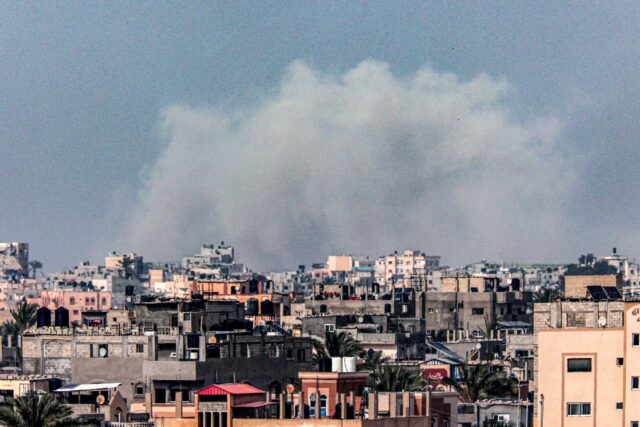
Israeli Prime Minister Benjamin Netanyahu vowed Sunday to send ground forces into Gaza’s southern Rafah city despite international fears for the fate of Palestinian civilians sheltering there.
The right-wing premier, whose security and war cabinets were also due to discuss latest international efforts towards a truce deal, stressed that “no amount of international pressure will stop us from realising all the goals of the war”.
“To do this, we will also operate in Rafah,” he told a cabinet meeting, before he was set to meet visiting German Chancellor Olaf Scholz for talks on the war raging since Hamas militants attacked Israel from Gaza on October 7.
Israel has repeatedly threatened to launch a ground offensive against Hamas in Rafah, now home to nearly 1.5 million mostly displaced Gazans sheltering near the Egyptian border.
UN World Health Organisation chief Tedros Adhanom Ghebreyesus urged Israel “in the name of humanity” not to launch a Rafah invasion, warning that “this humanitarian catastrophe must not be allowed to worsen”.
Washington, which provides Israel with billions of dollars in military assistance, has said it cannot support a Rafah operation without a “credible, achievable, executable plan” to shelter civilians.
As tensions have risen with Washington, Netanyahu also criticised the US Senate leader for urging the Israeli government to hold new elections, calling the comments “totally inappropriate.”
“We’re not a banana republic,” Netanyahu told CNN, blasting the remarks by Democratic Senate Majority Leader Chuck Schumer, the highest-ranking elected Jewish American in history.
Schumer, who visited Israel after October 7, had also called Netanyahu an obstacle to peace.
Netanyahu leads a coalition of religious and ultra-nationalist parties. His failure to bring home the hostages taken by Hamas militants during their attack has led to mounting protests within his country as well as domestic calls for early elections.
International envoys were planning to meet in Qatar soon to revive stalled talks for a ceasefire and hostage release deal.
A Hamas proposal calls for an Israeli withdrawal from “all cities and populated areas” in Gaza during a six-week truce and for more humanitarian aid, according to an official from the Palestinian group.
Israel plans to attend the talks, with cabinet members due to “decide on the mandate of the delegation in charge of the negotiations before its departure for Doha”, Netanyahu’s office said, without giving a date for when they would leave.
There has been no letup in the fighting, and at least 92 people were killed over the previous 24 hours, the health ministry in the Hamas-ruled territory said on Sunday.
The dead included 12 members of the same family whose house was hit in Deir al-Balah, central Gaza.
Palestinian girl Leen Thabit, retrieving a white dress from under the rubble of their flattened house, cried as she told AFP her cousin was killed in the strike.
“She’s dead. Only her dress is left,” Thabit said.
“What do they want from us?”
Second aid ship
Hamas’s October 7 attack resulted in about 1,160 deaths in Israel, mostly civilians, according to an AFP tally of official figures.
Israel’s retaliatory campaign against Hamas has killed at least 31,645 people in Gaza, most of them women and children, according to the health ministry.
Shelling and clashes were reported in south Gaza’s main city of Khan Yunis and elsewhere, and the Israeli army said its forces had killed “approximately 18 terrorists” in central Gaza since Saturday.
More than five months of war and an Israeli siege have led to dire humanitarian conditions in Gaza, where the United Nations has repeatedly warned of looming famine for the coastal territory’s 2.4 million people.
Humanitarians have cited Israeli restrictions as among the obstacles they face in reaching the needy. Israel has blamed shortages on the Palestinian side, specifically a lack of capacity to distribute aid once it gets in.
A second ship was due to depart from Cyprus along a new maritime corridor to bring food and relief goods, officials of the Mediterranean nation said.
On Saturday the US charity World Central Kitchen said its team had finished unloading supplies from a barge towed by Spanish aid vessel Open Arms which had pioneered the sea route.
Jordan on Sunday announced the latest aid airdrop over northern Gaza together with German, United States and Egyptian aircraft.
The United Nations has reported particular difficulty in accessing the north, where residents say they have resorted to eating animal fodder, and where some have stormed the few aid trucks that have made it through.
Malnutrition and disease
Palestinian militants seized about 250 Israeli and foreign hostages during the October 7 attack. Dozens were released during a week-long truce in November, and Israel believes about 130 remain in Gaza including 32 presumed dead.
Protesters again rallied in Tel Aviv on Saturday, carrying banners urging a “hostage deal now”.
“The civilians… need to demand from their leaders to do the right thing,” said one demonstrator, Omer Keidar, 27.
In Rafah, the situation has only grown worse, said medical staff at a clinic run by Palestinian volunteers offering treatment for displaced Gazans.
“We’re facing shortages of medications,” said Samar Gregea, a physician herself uprooted from Gaza City in the north.
“There are a lot of patients in the camp, with all children suffering from malnutrition” and a spike in hepatitis A cases, she told AFP.
“Children require foods high in sugars, like dates, which are currently unavailable.”
